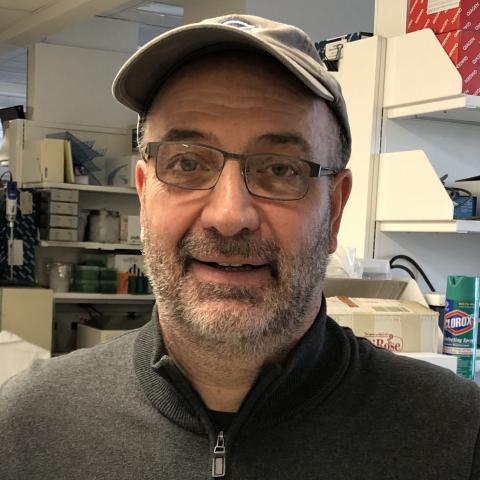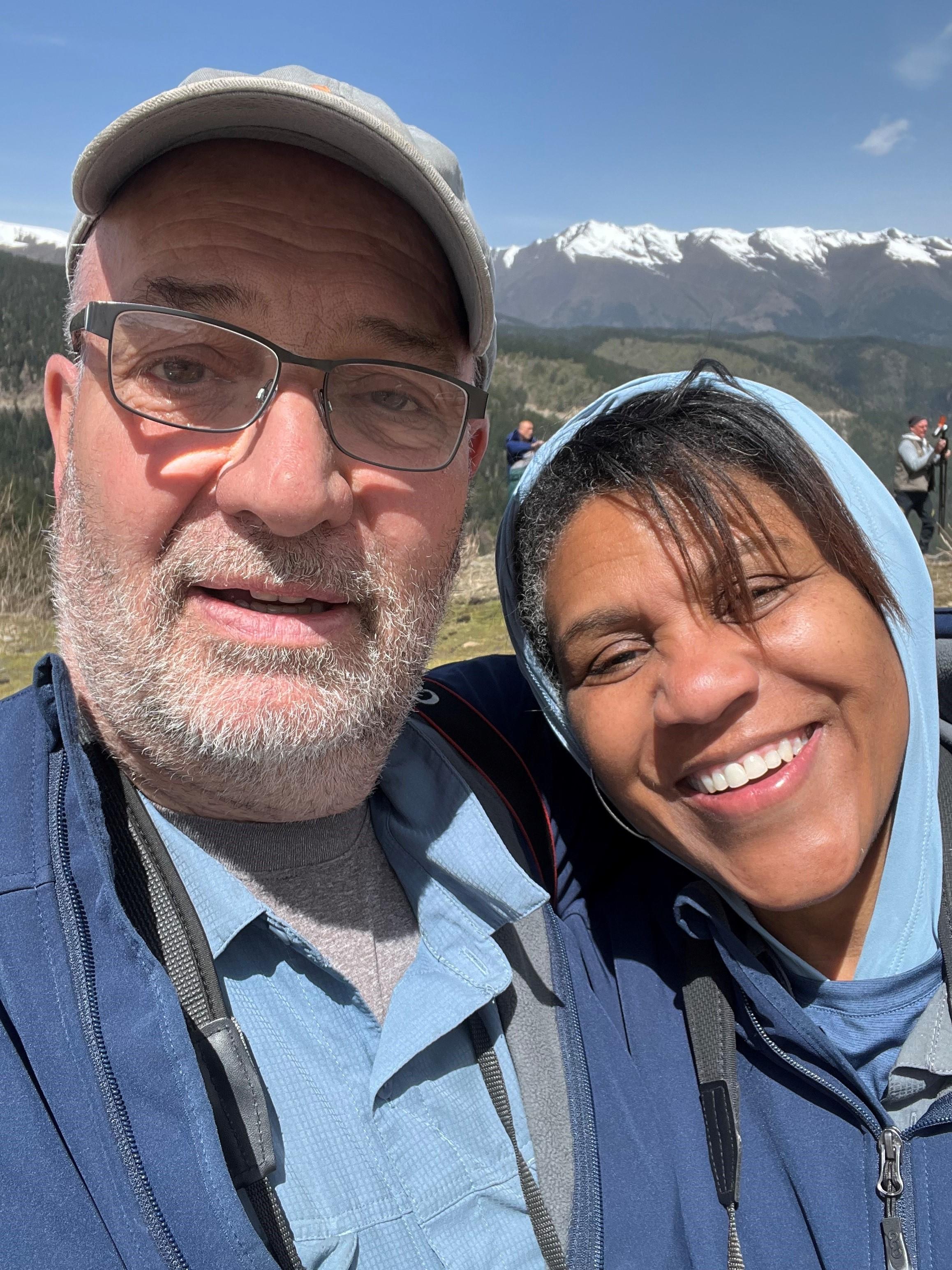
Stefan Ambs, Ph.D., M.P.H.
Stefan Ambs, Ph.D., M.P.H., is a molecular epidemiologist whose expertise is in prostate and breast cancer with a focus on cancer health disparities and risk factors that alter the tumor microenvironment. He is a pioneer in his field, combining translational research and data science approaches to identify exposures that promote tumor development and contribute to the excessive burden of cancer in the African American community. After almost 25 years at the NCI, he retired in May 2025.
Ambs earned a master's degree in biochemistry from the University of Tübingen, Germany, in 1988. After completing his Ph.D. in 1992 at the University of Würzburg, Germany, he trained as a postdoctoral fellow in the Laboratory of Human Carcinogenesis for several years. Ambs continued his research at a biotechnology company in California and at the Aventis Genomics Center in Cambridge, Massachusetts. In 2001, he returned to the NCI as a tenure-track investigator, earning a Master of Public Health degree in epidemiology from the Johns Hopkins Bloomberg School of Public Health shortly after. He then became a senior investigator in 2010.
Ambs’ research program thrives on the rare ability to combine epidemiology and data science research. His description of how inflammation may underlie the excessive burden of prostate cancer in men of African ancestry is a concept that has greatly impacted the prostate cancer field. His lab’s research efforts involve analyzing tumor, blood and urine biospecimens from men who represent different population groups, including African American and European American men from the US, and Ghanaian and Nigerian men within Africa. His discovery that aspirin may limit lethal prostate cancer metastasis in African American men could offer an opportunity for improved prevention focusing on inflammation and inflammation-induced alteration in the tumor microenvironment.
More recently, Ambs and his team showed how aggressive breast and prostate cancers in African Americans have distinct molecular features. Other investigations by his group linked neighborhood environment and chronic stress signaling to increased systemic inflammation and tumor immunity suppression in cancer patients. Lastly, his laboratory’s breast cancer studies sought to define how co-morbidities, ancestral genetic factors and stress signaling may impact breast cancer biology.
Ambs has received the NIH Merit Award, NCI Directors’ Awards for Innovation and Merit, an NCI Leading Diversity Award and CCR Health Disparity Flex award. He has established numerous productive collaborations within and outside the NCI community that have led to key advances in the field of health disparities research.
Xin Wei Wang, Ph.D., Senior Investigator in the Laboratory of Human Carcinogenesis and longtime colleague of Ambs’, says, “I have had the privilege of working alongside Stefan since 1992 as a colleague, collaborator and friend. His expertise in cancer epidemiology has been instrumental in shaping the design of my liver cancer studies. Stefan is both scientifically critical and constructively engaged, always bringing thoughtful insight with a big smile to every discussion. His presence has been a rare and valued combination of rigor, generosity and wonderful friendship.”
In the Q&A that follows, Ambs discusses how CCR supported his changes in research focus and his career advice for young researchers.
Which scientific achievements or accomplishments are you most proud of?
One achievement is my work on nitric oxide signaling, a critical pathway linked to cancer progression. When I was a postdoc, we published a paper that showed how nitric oxide is important at the transition point where a benign lesion turns into a malignant one in colon cancer. As an investigator, I began looking at nitric oxide in breast cancer, particularly triple-negative breast cancer, with Sharon Glynn, B.Sc., M.P.H. I also collaborated with David A. Wink Jr., Ph.D., of the Cancer Innovation Laboratory, who was instrumental to the success of our research. The molecular analysis of breast tumors showed that expression of the inducible nitric oxide synthase is closely correlated with worse outcomes in breast cancer. Our data also showed that nitric oxide changes the tumor microenvironment and promotes dedifferentiation, leading to tumors that are more resistant to cancer therapy.
Starting this research when I was in my postdoctoral fellowship with Curtis C. Harris, then pursuing it into something that is clinically significant, I think that’s a great success story. I believe that the finding, together with work from the Wink laboratory, is something that may really affect patients’ lives, as targeting the nitric oxide signaling pathway is now moving into clinical trials.
My health disparities research is what I would consider my second achievement. After exploring the possibility of pursuing a health disparities research program, and establishing cohorts from the greater Baltimore area, I pivoted my research towards tumor biology in relation to the excessive burden of prostate and breast cancer in African American patients, uncovering the details of why tumors are distinct from person to person and how the environment may cause these differences.
In 2008, we published a paper reporting an immune-inflammation and interferon signature that is prominent in African American men with prostate cancer, which has been confirmed by others. This and additional work from our group shows that tumor-associated and systemic immune biology and the inflammatory environment can be different between patient groups, in part induced by the environment but also related to ancestry, and may thereby contribute to cancer outcome disparities.
The most significant shift we made with our health disparity research was asking the question: When we observe these differences in tumors or systemically, where is it coming from? This is what brought us to studying the social and neighborhood environment, comorbidities and environmental stress. It took years to collect these data on various exposures, including chronic stress. Our team was one of the first to look at how the neighborhood environment may impact breast cancer biology and how it affects a person. We extended these studies to prostate cancer, looking at systemic changes in prostate cancer patients in association with health disparities, which was also pioneering work in the field. We put together a stress questionnaire to determine how exposure linked to stress signaling, and we found that stress can promote metastasis. So, in the context of disparities, not only does a person’s genetic background contribute to cancer risks, but the environment we live in can modify tumor biology and may also modify the risk related to genetics through gene-environment interactions.
With the pilot studies we’ve done, the field is now progressing with further studies using larger sample sizes. I'm glad I shifted into health disparity research, and I think our work will contribute to some actionable interventions.
How did the intramural environment at CCR impact your career or facilitate your research?
My research started out with many exploratory aspects; I also built up cohorts and did not have immediate results because our approach required years of follow-up. One of the most valuable things CCR gave me was time. I wasn’t required to have a certain amount of work published early on because the people at CCR understood that my work was an investment. I was able to take on this interesting and challenging work and develop it for years.
Do you have any advice for the next generation of cancer researchers?
I always say that you should create your own niche by looking at something new, something that has not been done before, that can make an impact. And when you decide to do it, be persistent, as it may take years to collect the data and resources before you even start publishing! Good science is a long-term investment.
Collaboration is also one of the most important parts of success. You need a network to find connections and necessary resources, and to learn new things. In my career journey, I had to pick up data science to further our work. Data science is a relatively younger field, and we did not use such technology prior to 2010. But we found people to collaborate with, to teach us, and then we were able to integrate it in our work. Science moves fast, and you must be flexible and move and learn with it.
Is there anything you are looking forward to in your retirement?
I am really into adventurous travelling, and I’m looking forward to having opportunities to do it now. I have many countries on my list: Australia, Madagascar, China. I have a lot of friends all over the world, so it will be great to visit them and reconnect.
When you are young, you may not have the time or money to go places. If you are fortunate to still be able to travel after you retire, you should get out there and do it.
Dr. Stefan Ambs retired on May 9, 2025, but remains as a special volunteer in the Laboratory of Human Carcinogenesis.
